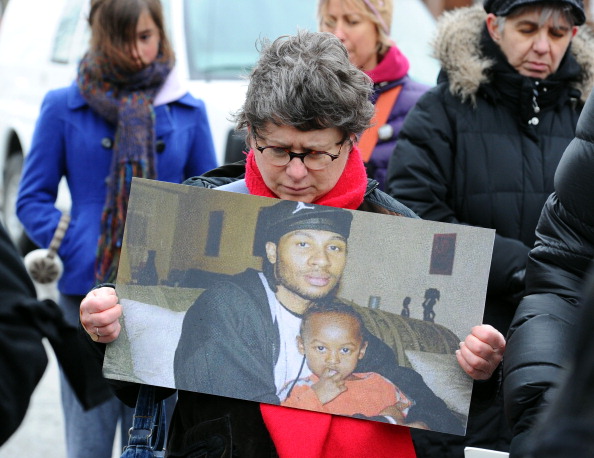TORONTO – A police officer who fired the shots that killed a mentally ill Toronto man told a coroner’s inquest Monday that the scissors being brandished by the 29-year-old left him scared for his life.

Const. Louie Cerqua said Michael Eligon, who was wandering the streets in a hospital gown and socks on that day in February 2012, did not respond to repeated shouts to drop what police considered to be two deadly edged weapons.
“Mr. Eligon wasn’t stopping, he wasn’t responding to any of the commands. I felt immediate or imminent danger towards myself,” Cerqua told the inquest, which is examining the deaths of Eligon and two other Toronto area residents who died in similar circumstances.
The situation escalated when Cerqua and another officer backed up against an SUV while Eligon continued to advance.
Cerqua remembers yelling to Eligon, “Drop the weapon or you will be shot.”
At that point, he recalls hearing Eligon shifting towards him and saying something.
“I heard, ‘One of you is going to die.’ That’s what I remember,” Cerqua said, while acknowledging that the inquest has heard other officers testify to different versions of that phrase.

Get daily National news
When he felt he was running out of space, Cerqua told the inquest he felt like he was in a precarious position.
“Space is closing, I engage with my firearm,” he said. “I was scared for my life.”
- 4 dead, 17 wounded after being caught in crossfire in entertainment district in Birmingham, Alabama
- Hundreds defrauded in door-to-door Ontario scam, Canada-wide warrants issued
- Kenneth Law responsible for ‘luring’ Ontario teen into suicide death, parents allege
- Quebec’s public security minister accuses gangs of using teens ‘to do their dirty work’
Cerqua said he had received training on how to deal with mentally ill people but in the heat of the moment, he didn’t consider other options like using a baton or discharging his pepper spray.
“With the high stress situation like that, you’re going to resort to your firearm, it’s the only real option you have,” he said.
But the lawyer representing Eligon’s family at the inquest argued that Cerqua could have tried harder to use other tactics before firing.
“In my view, if you have a pistol on somebody and he’s eight to ten feet away, you can always fire when he comes any closer, when he comes really close,” Peter Rosenthal said outside coroner’s court.
Eligon’s family is pushing for police to put more emphasis on de-escalation.
“If you yell at a guy for 10, 15, 20 seconds to drop the knife and it doesn’t happen, you might try some other approach, especially if you know the guy is emotionally disturbed,” said Rosenthal.
“In particular you might say ‘Michael, wait a second, Michael let’s talk about this.’ You may not get through but it’s certainly worth an attempt. It’s not dangerous at all.”
The inquest has heard that officers, including Cerqua, stomped on Eligon’s hands as he lay crumpled on the ground, to get him to drop his scissors.
A bleeding Eligon was also handcuffed before first aid was administered because he was still considered a threat.
The Special Investigations Unit – Ontario’s police watchdog – has cleared authorities of wrongdoing in Eligon’s death.
The inquest, which is also probing the police shooting deaths of Reyal Jardine-Douglas and Sylvia Klibingaitis, has raised questions about police use of force and how front-line officers deal with the mentally ill.
The jury presiding over the inquest may make recommendations at preventing similar deaths but is not tasked with finding fault or laying any blame.







Comments